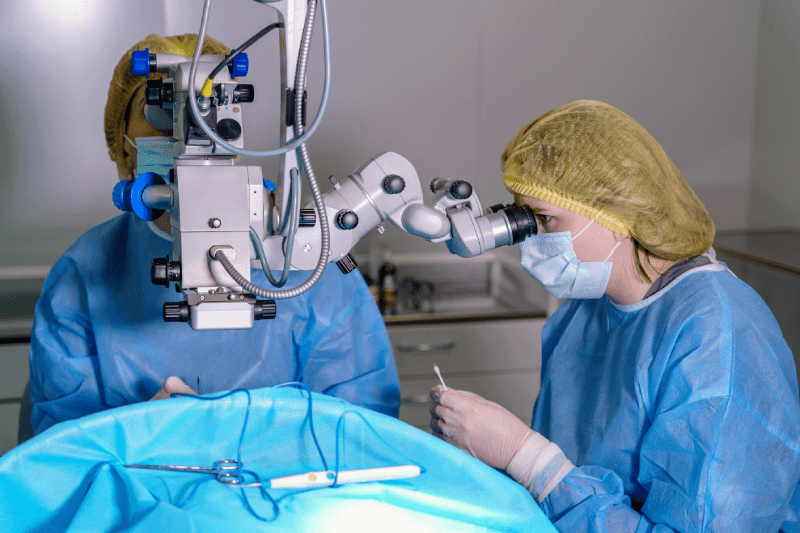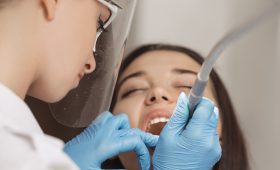How Does LASIK Work?
LASIK (Laser-Assisted In Situ Keratomileusis) is a two-stage surgical procedure that corrects refractive errors. In the first stage, your eye surgeon creates a thin, hinged flap or “cap” on the surface of the cornea, typically using a femtosecond laser. This flap is gently lifted to the side. In the second stage, an excimer laser is activated to reshape the underlying corneal tissue. This laser uses extremely precise and controlled pulses to microscopically vaporize tissue, aiming to correct curvatures that cause myopia, hyperopia, or astigmatism. Finally, the flap is repositioned and adheres naturally, requiring no stitches for healing.
Am I a Candidate for LASIK?
Whether you are a candidate for LASIK is determined by a comprehensive examination by your eye doctor, but general criteria exist. First, you must be 18 years or older and your prescription must not have significantly changed in the last year. One of the most critical factors is your corneal thickness; there must be enough tissue remaining for successful flap creation and reshaping underneath. Additionally, pregnant or breastfeeding women are usually put on a waiting list, and active eye infections, certain autoimmune diseases, or advanced severe dry eye syndrome can temporarily or permanently prevent candidacy.
Am I Too Old for LASIK?
There is no definite upper age limit for LASIK. As long as your overall eye health and corneal structure are suitable, you can undergo a successful LASIK operation even in your 60s or 70s. However, as age advances, conditions such as presbyopia (difficulty with near vision), which begins around age 40, and cataract, which appears in later years, come into play. Special LASIK techniques like monovision can be applied for presbyopia, while lens replacement surgery is usually recommended if cataracts develop. Therefore, your general eye health, corneal structure, and expectations from the surgery are more important than the age factor itself.
How Safe is LASIK?
LASIK is considered one of the safest surgical procedures available today, with millions of successful surgeries performed over more than 30 years. Technical advancements, especially the use of femtosecond lasers, have significantly reduced the risk of complications. The most important factor enhancing surgical safety is the patient’s detailed pre-assessment; proper candidate selection minimizes risks. Although rare, complications such as infection or flap displacement can occur, but these are generally treatable. Overall, LASIK applied to suitable candidates by skilled hands is considered very safe.
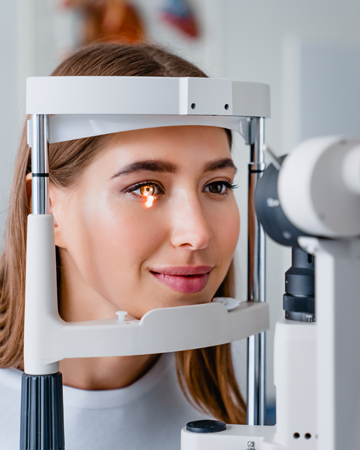
Is LASIK Painful?
The LASIK procedure is not painful. Before the surgery, local anesthetic drops are used to completely numb the eye surface, which prevents you from feeling pain. During flap creation, you may experience a brief, intense but painless pressure sensation on the eye; this pressure usually lasts only a few seconds and can be uncomfortable. The laser itself does not create any sensory feeling. After the surgery, there may be a mild burning, stinging, or watering sensation that can last for a few hours; this is a typical sign of healing that is easily managed with prescribed drops, rest, and protective goggles.
How Long Does LASIK Take?
The duration of LASIK surgery is surprisingly short. The total time spent in the operating room, including patient preparation, positioning, and operating on both eyes, is approximately 15 to 20 minutes. However, the actual treatment time the laser applies to the corneal tissue is quite brief. The laser reshaping the tissue typically lasts between 30 seconds and 1 minute per eye, depending on the degree of the error needing correction. This quick procedure time reduces stress for patients and helps speed up the recovery process by minimizing the invasive time on the eye.
How Accurate is LASIK?
LASIK is an extremely accurate method thanks to the precision of laser technology. Modern excimer laser devices can vaporize corneal tissue with a precision finer than a human hair strand. Due to technological advancements, the vast majority of patients (more than 95%) achieve at least 20/40 vision sharpness after surgery, and most achieve 20/25 or better vision, which is required for legal driving. The success of the surgery depends not only on the precision of the laser but also on the surgeon’s experience and the ultra-high accuracy of the pre-operative eye measurements.
What Happens If I Blink or Move During the Procedure?
You do not need to worry about blinking or moving during the surgery. The surgeon uses a small, safely placed instrument (speculum) to hold your eyelid open, thus preventing you from blinking. More importantly, modern LASIK lasers have an advanced technology called “eye-tracking.” This system detects even the slightest involuntary movement of your eye in less than a second and instantly stops the laser or readjusts its target according to your movement. In this way, the treatment is applied only to the correct area of the cornea, and precision is maintained at the maximum level.
How Soon After Surgery Will I Be Able to See?
You will begin to notice the improvement in your vision immediately on the operating table, although this vision will initially be blurry or misty. Most patients experience a significant increase in visual acuity when they wake up the morning after the surgery, which is often a great surprise. Many individuals can perform most of their daily activities (such as showering, looking at a computer) within the first 24 to 48 hours after the surgery. Achieving full and clear visual acuity varies from patient to patient but usually takes a few days to a week.
When Can I Drive?
To start driving, you generally need to wait for the first follow-up examination, which is performed the day after the surgery. During this check-up, your doctor tests whether your visual acuity meets the legal driving limits (20/40 or better in most countries). Most LASIK patients can drive safely after this check-up. However, since glare or halo effects may be experienced, especially during night driving in the first few weeks, it is recommended to avoid driving at night until you feel completely comfortable. Your doctor’s driving approval is the final step you should take for your safety.
What Are the Possible Complications?
Potential complications of LASIK are generally rare and temporary, but there are some conditions patients should be aware of. The most common side effect is dry eyes, which can persist, especially for the first few weeks or months, and is managed with artificial tear drops. Other potential complications include seeing glare or halo effects around lights, particularly at night, not achieving full correction (under- or over-correction), and flap-related issues (displacement or irregular healing). Fortunately, thanks to the advancement of laser technology, permanent complications leading to severe vision loss are extremely rare.
How Long Does the Effect of LASIK Last?
The reshaping of the cornea with LASIK is permanent, and the correction itself lasts for a lifetime; meaning the effect applied by the laser does not disappear. However, two main factors can cause your prescription to change after LASIK: 1) Very rarely, a small amount of myopia returning due to the eye’s natural healing process (regression). 2) Natural changes due to aging, especially presbyopia (near reading need) that starts after age 40 and cataracts that may develop in later years, which LASIK does not correct. These natural aging processes do not affect the permanence of LASIK, they may only necessitate a new need for reading glasses.
How Often Will I Need to See a Doctor After Surgery?
The follow-up schedule after LASIK varies depending on your eye doctor’s protocol and your healing speed, but a standard schedule exists. Typically, the most critical check-ups are done within the first 24 hours after surgery (the next day), followed by checks at 1 week, 1 month, and 3 months. It is important to continue follow-up checks at intervals determined by your doctor (usually 6 months and 1 year) throughout the first year after surgery. These regular check-ups are vital for monitoring flap healing, vision stability, management of possible side effects like dry eye, and ensuring long-term success.
Can I Wear Contact Lenses Before Surgery?
No, it is absolutely mandatory to stop wearing contact lenses before your LASIK surgery. Contact lenses temporarily change the natural shape of your cornea, and for accurate corneal measurements to be taken before LASIK, the cornea must have fully returned to its original, natural shape. The general rule is to stop wearing soft contact lenses at least one week before the surgery, and hard or gas permeable lenses (RGP) for several weeks (sometimes a month or more). Please strictly follow the specific and personalized instructions given to you by your eye doctor regarding this matter.
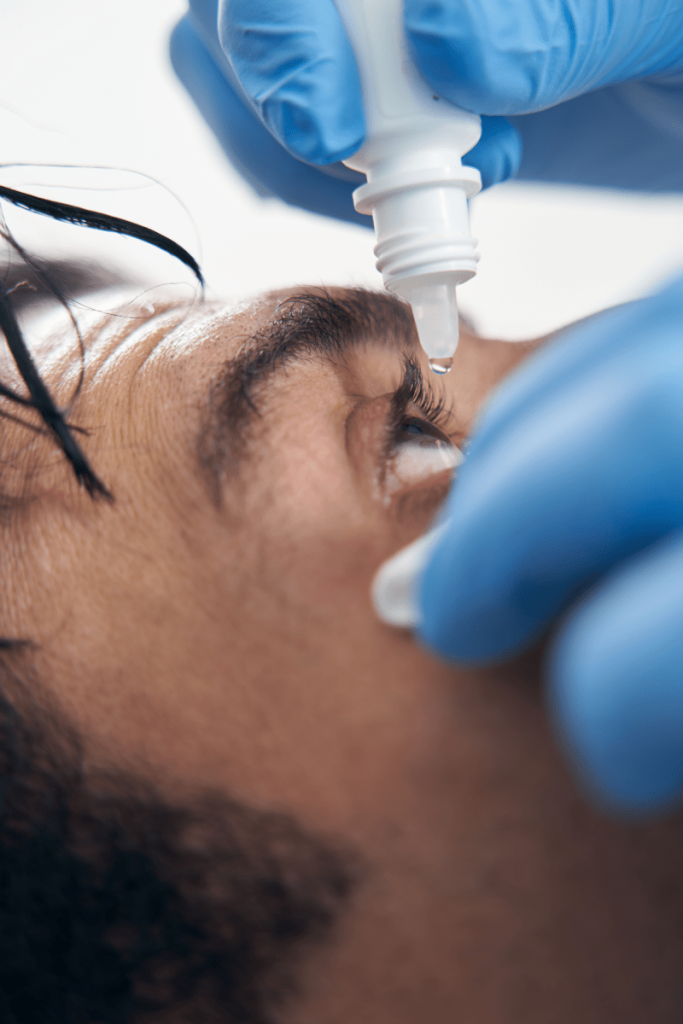
Antalya LASIK Eye Surgery Prices: Why is Turkey a Reliable Choice?
Getting rid of glasses and contact lenses is the dream of millions. LASIK (Laser-Assisted In Situ Keratomileusis) is considered the most common and reliable method for correcting refractive errors today. However, the cost of this advanced technology treatment in Western countries can reach unaffordable levels for many.
Turkey, especially Antalya, the heart of the Mediterranean for tourism and health, has become a global health tourism center with its high-tech hospitals, specialist physicians, and attractive price advantages. LASIK eye surgery in Antalya offers an excellent opportunity for international patients due to both its cost-effectiveness and the high quality it provides. This guide will answer all questions about LASIK treatment, explain the advantages of receiving treatment in Antalya, and detail how you can turn this process into a stress-free and comfortable holiday with Cure Holiday assurance.
What is LASIK Eye Surgery and What is its Basic Principle?
LASIK is a minimally invasive laser surgical method used to correct common refractive errors such as myopia (nearsightedness), hyperopia (farsightedness), and astigmatism. Essentially, it reshapes the cornea, the transparent front layer of the eye, to ensure light is focused correctly on the retina. The procedure consists of creating a thin flap on the surface of the cornea, reshaping the underlying tissue with a laser, and repositioning the flap.
What Are the Differences Between Classic LASIK, Femto-LASIK, and ReLEx SMILE?
LASIK technology is constantly evolving. Classic LASIK uses a microkeratome (blade) for the flap creation stage; Femto-LASIK (IntraLASIK) creates the flap entirely without a blade using a Femtosecond laser, which means a more precise and safer flap. ReLEx SMILE is the newest technology; it is performed by removing a small lenticule (a piece of tissue) inside the cornea without creating a flap, which speeds up healing and reduces the risk of dry eyes. The treatment plan is determined by the specialist physician in Antalya based on the patient’s eye structure.
What is the Total Duration of LASIK Surgery?
LASIK surgery generally takes only 10 to 15 minutes in total for both eyes. The actual tissue correction time of the laser is often less than 30 seconds. This quick procedure means minimal discomfort, and patients usually start noticing an improvement in their vision a few hours after the procedure.
Is Pain or Discomfort Felt During Laser Eye Surgery?
Anesthetic drops are applied to the eye during the procedure so that the patient does not feel any pain. Thus, the surgical process is completely painless. After the procedure, when the effect of the anesthesia wears off, a mild sensation of stinging, burning, or watering may occur, lasting 4-6 hours; this is easily controlled with moisturizing and pain-relieving drops recommended by the physician.
What is the Vision Recovery Process After LASIK Like?
Vision recovery after LASIK is quite rapid. Most patients achieve 80-90% visual acuity the day after the surgery and can return to their daily activities. Reaching full vision stability can vary from a few weeks to a few months. Especially during the first week, resting and using the drops recommended by the physician are critically important.
What Are the Possible Side Effects and Risks After LASIK?
Like any surgical procedure, LASIK also has potential side effects and risks. The most common temporary side effects include dry eyes (which can last a few months), difficulty with night vision, halos (rings around light), or starbursts (streaks of light). Serious risks (infection, flap displacement, permanent vision loss) are quite rare thanks to the advanced technology and hygiene standards of Antalya clinics and experienced surgeons.
Will I Need to Wear Glasses Again After Laser Eye Surgery? (Long-Term Results)
The main goal of LASIK surgery is to end the patient’s dependence on glasses or contact lenses for life. The success rate is very high. Rarely, the eye prescription may return a very small amount years later (regression). This can be easily corrected with an “enhancement” procedure if the corneal thickness is suitable. Presbyopia (age-related difficulty with near vision), which starts after age 40, is not related to LASIK and is a separate condition.
What Should Be Considered During the Recovery Period? (Care Rules)
Patients must adhere to strict rules during the recovery period: In the first week, eyes should not be rubbed, water should not touch the eyes (care should be taken when bathing), makeup should not be worn, and dusty environments should be avoided. Protective goggles given by the physician must be worn even while sleeping at night. Eye drops must be used regularly to prevent infection and moisturize the eye. Activities that carry a risk of infection, such as swimming pools and saunas, should be avoided for the first month.
Are There Alternative Treatments Other Than LASIK for High Eye Prescriptions?
LASIK may not be suitable for patients with very thin corneas or very high prescriptions (e.g., -10.00 and higher myopia). In such cases, alternatives like Intraocular Lens (ICL) implantation, which involves placing a lens inside the eye without changing the shape of the cornea, are evaluated. Specialists in Antalya offer the most suitable treatment option for the patient’s condition after a comprehensive examination.
Why is the Laser Technology Used in LASIK Treatment Important?
The type (especially Femtosecond laser) and precision of the laser used in the treatment directly affect both the safety of flap creation and the accuracy of vision quality. High-standard clinics in Antalya generally use the latest generation laser technologies that can create personalized treatment profiles (Wavefront/Topography Guided). This means fewer side effects and sharper visual quality.
Why is the Laser Technology Used in LASIK Treatment Important?
The type (especially Femtosecond laser) and precision of the laser used in the treatment directly affect both the safety of flap creation and the accuracy of vision quality. High-standard clinics in Antalya generally use the latest generation laser technologies that can create personalized treatment profiles (Wavefront/Topography Guided). This means fewer side effects and sharper visual quality.
Why is the Laser Technology Used in LASIK Treatment Important?
The type (especially Femtosecond laser) and precision of the laser used in the treatment directly affect both the safety of flap creation and the accuracy of vision quality. High-standard clinics in Antalya generally use the latest generation laser technologies that can create personalized treatment profiles (Wavefront/Topography Guided). This means fewer side effects and sharper visual quality.
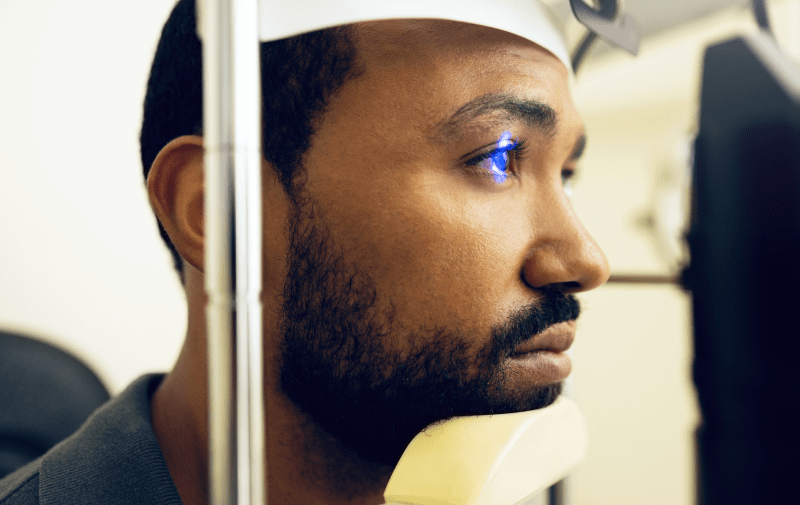
Why is the Laser Technology Used in LASIK Treatment Important?
The type (especially Femtosecond laser) and precision of the laser used in the treatment directly affect both the safety of flap creation and the accuracy of vision quality. High-standard clinics in Antalya generally use the latest generation laser technologies that can create personalized treatment profiles (Wavefront/Topography Guided). This means fewer side effects and sharper visual quality.
Why is the Laser Technology Used in LASIK Treatment Important?
The type (especially Femtosecond laser) and precision of the laser used in the treatment directly affect both the safety of flap creation and the accuracy of vision quality. High-standard clinics in Antalya generally use the latest generation laser technologies that can create personalized treatment profiles (Wavefront/Topography Guided). This means fewer side effects and sharper visual quality.
Why is the Laser Technology Used in LASIK Treatment Important?
The type (especially Femtosecond laser) and precision of the laser used in the treatment directly affect both the safety of flap creation and the accuracy of vision quality. High-standard clinics in Antalya generally use the latest generation laser technologies that can create personalized treatment profiles (Wavefront/Topography Guided). This means fewer side effects and sharper visual quality.
Why is the Laser Technology Used in LASIK Treatment Important?
The type (especially Femtosecond laser) and precision of the laser used in the treatment directly affect both the safety of flap creation and the accuracy of vision quality. High-standard clinics in Antalya generally use the latest generation laser technologies that can create personalized treatment profiles (Wavefront/Topography Guided). This means fewer side effects and sharper visual quality.
Why is the Laser Technology Used in LASIK Treatment Important?
The type (especially Femtosecond laser) and precision of the laser used in the treatment directly affect both the safety of flap creation and the accuracy of vision quality. High-standard clinics in Antalya generally use the latest generation laser technologies that can create personalized treatment profiles (Wavefront/Topography Guided). This means fewer side effects and sharper visual quality.
How Should One Prepare for LASIK Treatment? (Stopping Lens Use)
It is mandatory to stop using contact lenses for at least one week (soft lenses) or longer (hard/gas permeable lenses) before the treatment. The reason for this is that contact lenses temporarily change the shape of the cornea. The cornea must return to its natural shape for accurate measurement and planning. Cure Holiday provides detailed instructions to patients during this preparation period.
When Can I Drive and Return to Work After LASIK?
Most patients reach a legally sufficient level of visual acuity to drive after the control check performed the day after the surgery. However, avoiding night driving is recommended for the first few days. Light activities such as office work can usually be resumed within 24-48 hours. Heavy physical activity and sports require a break of at least 1-2 weeks.
What is Included in the Price of LASIK Surgery?
LASIK prices generally cover: Comprehensive pre-examination and diagnostic tests (corneal topography, thickness measurement, etc.); the laser surgery fee; post-surgery initial checks and examinations; and the necessary medication/drop sets for initial use. However, while these prices in Western countries usually only cover the surgery, Türkiye’de Cure Holiday packages may also include additional services like accommodation and transfers.
Why Has Antalya Become a Global Center for Laser Eye Surgery?
Antalya offers an ideal infrastructure for health tourism with an international airport, hotels with high service standards, and luxury holiday opportunities. High competition has encouraged clinics to continuously invest in the latest technology and provide world-class service. Patients get the opportunity to have a holiday full of the beauties of the Mediterranean while keeping treatment costs low.
Why Are LASIK Prices in Antalya Much Lower Compared to Europe and the USA?
The main reasons why LASIK prices in Antalya are 50% to 70% lower than in the West are: The low general operating costs (energy, rent, personnel salaries) in Turkey; the exchange rate advantage of foreign currencies against the TL; and the high-volume health tourism policies supported by the government. This price difference does not mean quality is compromised; rather, it means accessing the same technology at a more affordable cost.
Quality Standards and Accreditations of Hospitals and Clinics in Antalya
Antalya clinics preferred for LASIK usually have international accreditations such as JCI (Joint Commission International). These accreditations indicate that the clinics adhere to the highest standards of hygiene, patient safety, and medical quality. Cure Holiday only cooperates with hospitals that meet these international standards and have the latest technology.
The Experience of Turkish Eye Surgeons in Laser Eye Surgery
Turkey stands out with surgeons who have a high case volume, especially in the field of LASIK. Due to the intense demand from abroad, Turkish eye surgeons perform significantly more laser procedures compared to their colleagues in other countries. This accumulation of experience plays a critical role in managing complex cases and increasing treatment success.
Comfort of Accommodation and Rest During the Treatment Process in Antalya
Resting on the first day is crucial for rapid recovery after LASIK. Cure Holiday packages offer accommodation in luxury 4 or 5-star hotels near the center, overlooking the sea. This comfortable environment helps patients reduce post-operative stress and spend the recovery process in a pleasant holiday atmosphere.
Can I Have a Holiday in Antalya After Laser Eye Surgery?
Yes, you can enjoy Antalya after a short recovery period (usually 24-48 hours) following LASIK. Provided you follow the doctor’s instructions, you can take light walks, visit historical sites, or relax at your luxury hotel. It is essential to protect the eyes from the sun, sea, and pool water for the first month. Wearing sunglasses is mandatory.
Language Support and Ease of Communication During Treatment in Antalya
The language barrier, one of the biggest concerns for health tourism patients, is completely eliminated in the distinguished clinics in Antalya and Cure Holiday services. Hospitals and Cure Holiday provide patient coordinators and interpreters fluent in English, German, Russian, and other languages. This ensures that all your communication, including medical terms, proceeds clearly and comprehensibly.
Ease of Access to Antalya (Airport and Transfers)
Antalya Airport (AYT) is a central hub with heavy international traffic, easily accessible via direct flights from Europe and Asia. Cure Holiday packages include all VIP Transfers from the airport to your hotel and the clinic. Patients feel safe and comfortable from the moment their plane lands.
What is the Average Length of Stay in Turkey for Laser Eye Treatment?
The recommended total length of stay in Turkey for LASIK surgery is generally short due to the rapid nature of the operation: 3 to 5 days is sufficient. This period covers the comprehensive pre-examination, surgery, the mandatory check-up the next day, and a few days of rest/holiday.
What Additional Services Can Be Included in the LASIK Price?
Packages purchased with Cure Holiday usually include, in addition to the surgery cost: accommodation, VIP transfers, interpretation service, initial medication set, protective goggles, and post-treatment support services. This ‘all-inclusive’ approach eliminates hidden costs often found in the West.
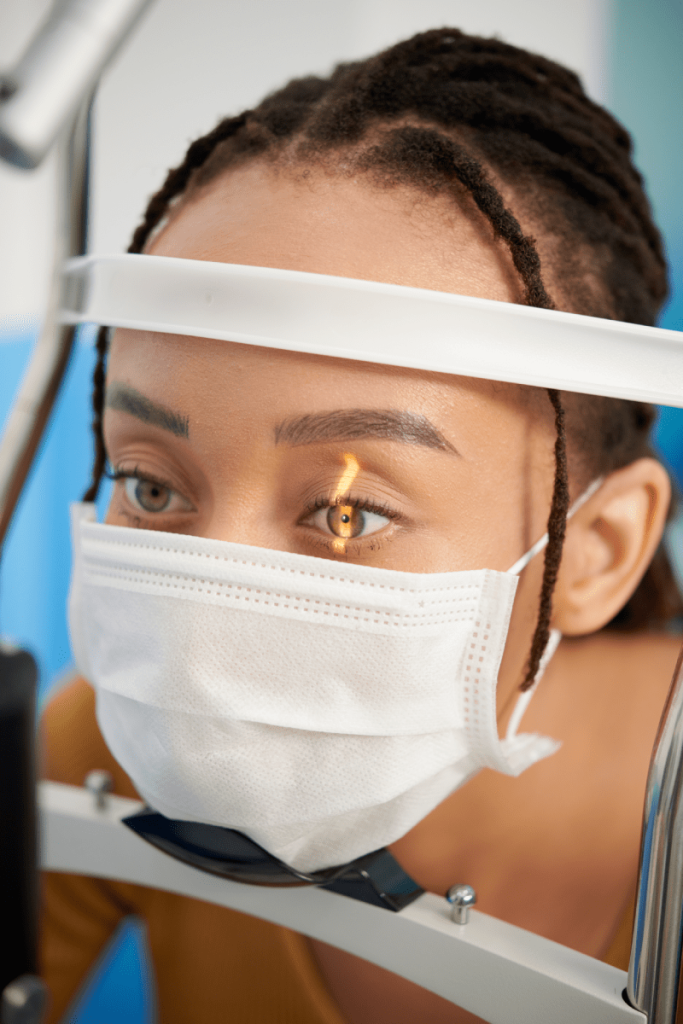
Warranty and Follow-up Process After Eye Surgery in Turkey
The warranty provided for LASIK operation usually covers the enhancement operation in case of prescription regression or a surgical complication. Cure Holiday provides patients with international standard warranty documents from the clinics it cooperates with. The communication channel remains open even after you return to your country, and remote consultation is provided when necessary.
Financial Transparency and Ease of Payment in Treatment in Antalya
Cure Holiday ensures full financial transparency by offering patients a clear, all-inclusive price before treatment begins. Payment can be made in different currencies such as EUR, USD, or GBP. After the treatment plan is approved, a small pre-payment is usually taken, and the remaining amount is paid upon arrival at the clinic in Antalya.
LASIK Treatment in Antalya with Cure Holiday: A Reliable Partnership
Cure Holiday: Why is it Your Reliable Partner in Health Tourism?
Cure Holiday was established to combine a sensitive treatment like LASIK eye surgery with the highest medical and logistical standards, utilizing Turkey’s cost advantage. We are not just an intermediary but an organization that plans, manages your entire travel and treatment process from A to Z, and provides you with personal support. Our goal is to offer you not only clear vision but also a stress-free experience.
Cure Holiday’s Cooperation with Distinguished Hospitals in Antalya
Cure Holiday only cooperates with distinguished eye hospitals and clinics in Antalya that have advanced technology, international accreditations, and high success rates in LASIK surgery. This strategic partnership ensures that patients are always in the best hands and treated with the latest laser devices.
Content of Cure Holiday All-Inclusive LASIK Packages
Cure Holiday LASIK packages are focused on financial transparency and high-level comfort. Package content typically includes:
- Comprehensive Preliminary Examination: All necessary corneal and eye tests.
- Laser Surgery: Operation fee according to the chosen technology (Femto-LASIK/SMILE).
- Luxury Accommodation: 3-5 nights stay in a 4 or 5-star hotel.
- VIP Transfers: All private transfers between the airport (AYT), hotel, and clinic.
- Language Support: Personal patient coordinator and interpretation service.
- Post-Surgery Care: Necessary medications, drops, and protective goggles.
- International Warranty Certificate: Warranty and follow-up service received from the clinic.
How Does the Treatment Journey Begin? (Free Preliminary Assessment)
Your journey to get rid of glasses and lens dependency begins with a simple step: Contact Cure Holiday and share your eye prescriptions and general health history. Our specialist physicians perform a Free Preliminary Suitability Assessment based on this information. As a result of this assessment, you will be offered the most suitable laser type (Femto-LASIK, SMILE, etc.) for you and a clear, all-inclusive price quote.
Personalized Travel and Appointment Coordination
Appointment scheduling and flight/accommodation coordination are important in LASIK treatment. Cure Holiday determines the surgical date that best suits your flight and holiday plans. All your clinic appointments and check-ups are reserved on your behalf. This process in Fethiye is managed comfortably and personalized, like planning a holiday.
Personal Support Services Before and After Surgery
Cure Holiday provides detailed information and guidance on all matters before treatment, such as the duration of contact lens cessation and preparation for boarding a plane. After the surgery, we assist you in following resting and drop usage instructions and offer 24/7 support in case of any discomfort.
Accommodation Comfort: Recovery in Antalya’s Best Hotels
To ensure our patients spend their recovery period in the most comfortable and peaceful way, we choose Antalya’s most highly-rated, luxury hotels as Cure Holiday. We offer both the dimly lit and quiet environment required for rest on the first day, and the comfort of enjoying the sunny weather of the Mediterranean and the hotel amenities afterward.
Ease of Payment and Price Guarantee with Cure Holiday
Cure Holiday eliminates the risk of unexpected extra costs often found in the West. The price quote provided to you is fixed and guaranteed by contract. We minimize your financial stress by offering ease of payment in different currencies (EUR, USD, GBP) and flexible payment terms.
Patient Success Stories and References
The success stories of international patients who received LASIK treatment in Antalya with Cure Holiday are the strongest proof of our service quality. Our customer satisfaction is related to both the happiness of achieving clear vision and the stress-free management of the entire process. Upon your request, we can share the transformation stories of similar cases with you.
When is the Most Ideal Season for Laser Eye Surgery?
LASIK can be performed in any season, but it is important to protect the eyes from the sun, dust, and water during the recovery period. The most ideal months in Antalya are spring (April-June) and autumn (September-October), when extreme heat and intense beach activities are not prevalent. These months also generally offer more favorable prices for hotel accommodation.
Cure Holiday and Commitment to Long-Term Follow-up
Even after your treatment is over and you return to your country, Cure Holiday keeps the communication channel open to you. We continue to provide consultation on the long-term health of your eye and the need for check-ups. We are just a phone call away if you have any questions about your new vision.
Limited-Time Campaigns and Special LASIK Opportunities
Cure Holiday occasionally organizes attractive campaigns exclusively for international patients, offering additional discounts, free accommodation upgrades, or VIP service upgrades on LASIK packages. Do not forget to ask about our current offers to achieve the best technology at the most favorable cost.
Contact Us and Apply for Your Free Preliminary Assessment Immediately!
Say goodbye to glasses and lenses. Achieve clear and free vision with the assurance of Turkey’s expertise, Antalya’s high-tech hospitals, and Cure Holiday’s personal service. Contact us today, get your Free Preliminary Suitability Assessment, and instantly receive your personalized, all-inclusive LASIK price quote. Take the first step on the road to clear vision!
